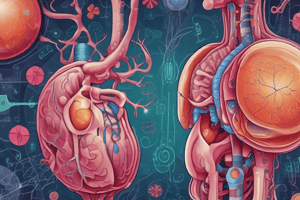Podcast
Questions and Answers
Which of the following is a role of the kidneys?
Which of the following is a role of the kidneys?
- Regulation of heart rate
- Production of insulin
- Maintain normal body fluid volume (correct)
- Storage of vitamins and minerals
What condition is NOT considered a cause of renal diseases?
What condition is NOT considered a cause of renal diseases?
- Hypertension
- Congenital Abnormalities
- Obesity (correct)
- Diabetes
Which indicator could suggest the presence of renal disease?
Which indicator could suggest the presence of renal disease?
- Enlarged gums (correct)
- Increased thirst
- Dry skin
- Frequent urination
What might patients on dialysis be taking that requires awareness?
What might patients on dialysis be taking that requires awareness?
Which condition is a consequence of renal disease?
Which condition is a consequence of renal disease?
Which of the following is NOT a sign or symptom of kidney disease?
Which of the following is NOT a sign or symptom of kidney disease?
What is a common cardiovascular impact of kidney disease?
What is a common cardiovascular impact of kidney disease?
Which of the following represents a gastrointestinal symptom of kidney disease?
Which of the following represents a gastrointestinal symptom of kidney disease?
What type of medications are prescribed after renal transplantation?
What type of medications are prescribed after renal transplantation?
What increased risk is associated with the immunological impact of kidney disease?
What increased risk is associated with the immunological impact of kidney disease?
What is a common consequence of the immunosuppressant drugs taken after a kidney transplant?
What is a common consequence of the immunosuppressant drugs taken after a kidney transplant?
Which dental condition is explicitly mentioned as a risk due to renal disease?
Which dental condition is explicitly mentioned as a risk due to renal disease?
Which symptom is NOT typically associated with infection in kidney transplant patients?
Which symptom is NOT typically associated with infection in kidney transplant patients?
What effect can cyclosporine have on a patient's health?
What effect can cyclosporine have on a patient's health?
What is a common oral side effect of renal disease that affects taste sensation?
What is a common oral side effect of renal disease that affects taste sensation?
Flashcards
Kidney Functions
Kidney Functions
Maintain body fluid volume, composition, and excrete waste products and drugs.
Leading Causes of Renal Disease
Leading Causes of Renal Disease
Hypertension and diabetes.
Renal Hypofunction
Renal Hypofunction
Kidneys not performing optimally.
Causes of Renal Outflow Blockage
Causes of Renal Outflow Blockage
Signup and view all the flashcards
Metabolic Impacts of Kidney Disease
Metabolic Impacts of Kidney Disease
Signup and view all the flashcards
Cardiovascular Impacts of Kidney Disease
Cardiovascular Impacts of Kidney Disease
Signup and view all the flashcards
Gastrointestinal Impacts of Kidney Disease
Gastrointestinal Impacts of Kidney Disease
Signup and view all the flashcards
Neuromuscular Impacts of Kidney Disease
Neuromuscular Impacts of Kidney Disease
Signup and view all the flashcards
Hematological Impacts of Kidney Disease
Hematological Impacts of Kidney Disease
Signup and view all the flashcards
Post-Kidney Transplant Management
Post-Kidney Transplant Management
Signup and view all the flashcards
Immunosuppressant Risks
Immunosuppressant Risks
Signup and view all the flashcards
Candida Infections
Candida Infections
Signup and view all the flashcards
Viral Infections
Viral Infections
Signup and view all the flashcards
Xerostomia
Xerostomia
Signup and view all the flashcards
Halitosis
Halitosis
Signup and view all the flashcards
Study Notes
Overview of Renal Diseases
- Renal diseases may manifest through symptoms like enlarged gums and other oral signs.
- Kidneys maintain body fluid volume and composition, excrete waste products and drugs.
- Liver transplants increase susceptibility to renal diseases.
Causes of Renal Diseases
- Hypertension and diabetes are leading causes.
- Conditions like glomerulonephritis and congenital abnormalities contribute to renal issues.
- Renal hypofunction can occur, indicating kidneys are not performing optimally.
- Blockage of renal outflow can be caused by kidney stones or prostate tumors.
Potential Impacts of Kidney Disease
- Metabolic: Electrolyte imbalances, glucose in urine, increased thirst.
- Cardiovascular: Elevated blood pressure, atherosclerosis, thickening of blood vessels.
- Gastrointestinal: Decreased appetite, weight loss, nausea, vomiting, potential peptic ulcers.
- Neuromuscular: Symptoms such as headaches, nerve tremors, and drowsiness.
- Hematological: Increased bleeding risk due to platelet dysfunction and anemia.
- Skin: Increased susceptibility to bruises and rashes.
- Immunological: Higher risk of infections due to weakened immune defense.
Signs and Symptoms of Kidney Disease
- Weight loss and reduced appetite.
- Swelling in ankles, feet, or hands due to fluid retention.
- Increased frequency of urination.
- Shortness of breath (possibly linked to hematuria).
- Presence of blood in urine.
Diet and Medication Restrictions
- Dietary modifications are critical for renal transplant patients.
- Common post-transplant medications include corticosteroids, azathioprine, and cyclosporine.
Kidney Transplant Statistics
- Approximately 3,000 individuals require kidney transplants annually in the UK.
Dental Implications of Renal Disease
- Immunosuppressant drugs post-kidney transplant increase infection risk.
- Symptoms of infection may include shortness of breath and swollen gums, complicating dental procedures.
Oral Health Concerns
- Candida infections: Treatable with antifungal gels.
- Viral infections: Includes herpes simplex and cytomegalovirus, which may cause fatigue and swollen glands.
- Risk of lymphomas and skin-related cancers, such as Kaposi sarcoma, which can lead to gingival overgrowth.
Other Dental Considerations
- Dry mouth (xerostomia), bad breath (halitosis), and metallic taste may occur.
- Possible stunted growth in dental structures and swollen salivary glands.
- Tooth eruption patterns may be affected.
- Enamel hypoplasia may result from kidney disease.
Dental Management for Renal Disease
- Understanding the functions of the kidneys is crucial for dental practitioners.
- Comprehensive management plans must consider the specific health needs of patients with renal diseases.
Studying That Suits You
Use AI to generate personalized quizzes and flashcards to suit your learning preferences.




